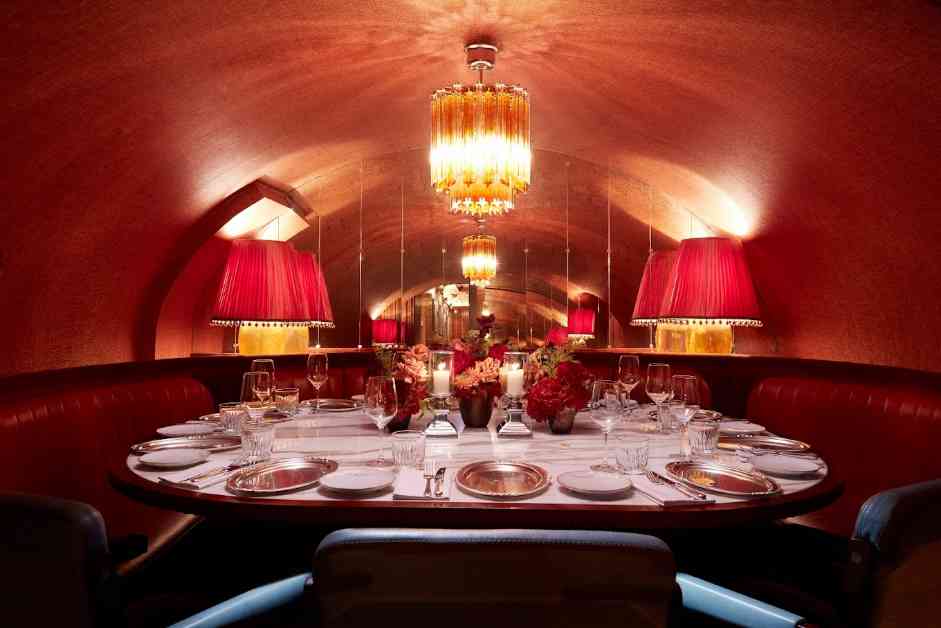Luxury London Restaurants Imposing Reservation Fees
Luxury dining in London is taking on a new level of exclusivity, not just based on the culinary experience, but due to the price of securing a reservation. A growing trend among high-end restaurants involves imposing reservation fees and minimum spend requirements, ranging from £25 to £100 per person. This shift is in response to a surge in no-shows, social media influencers exploiting complimentary meals, and bots reselling prime-time bookings.
## The Battle Against Reservation Abuse
Restaurants like Gymkhana, a two-Michelin-starred Indian gem in Mayfair, have taken bold steps to combat reservation abuse. Since November 2024, the establishment has implemented a £100 minimum spend per diner to deter reservation bots and resale websites from targeting their bookings. This move was deemed necessary to ensure that genuine diners secure reservations.
Hutong, situated in The Shard, now mandates an £80 per person spend on Fridays and Saturdays, while St James’s Chutney Mary has set a £60 per person minimum spend for dinner service. MW Eat, the group behind Chutney Mary, explains that this policy aims to prevent customers from treating their upscale Indian cuisine as a casual takeaway option, where diners order a few main dishes and skimp on sides.
## The Financial Pressures Facing London’s Hospitality Industry
The hospitality sector in London is under mounting financial strain due to escalating costs such as higher wages, increased rents, and rising food prices. According to Chris D’Sylva, owner of the Michelin-starred Dorian in Notting Hill, a £25 per head deposit was introduced to discourage patrons from making multiple reservations across different venues and only showing up at one. He labeled this behavior as “reservation-squatting” and emphasized that the absence of financial penalties made it too convenient for diners to book tables without genuine intentions.
D’Sylva also highlighted the surge in import costs, stating, “Premium ingredients from Japan now have to be flown around Russia, pushing costs even higher.” Additionally, he noted that several regular customers had departed the UK following Labour’s non-dom tax crackdown, contributing to a decrease in foot traffic.
## Pushback Against Influencer Requests and Bots
Restaurants are also pushing back against social media influencers seeking complimentary meals in exchange for Instagram posts. D’Sylva disclosed that he frequently declines these collaboration requests as influencers often order the bare minimum to showcase locations online. Matt Tucker, head of global restaurant booking platform Tock, echoed these sentiments, noting that while minimum spends may not be a welcoming message, they are a necessary response to the excesses of “influencer culture.”
In addition to influencers, restaurants are grappling with automated bots that bulk-book tables, making it challenging for genuine diners to secure reservations. Tucker condemned this practice, likening bots to influencers in terms of disruptive impact. Platforms like Dorsia now enforce minimum spend requirements on all bookings, with fees ranging from £50 to £150 in London.
## Extending Reservation Fees to High-End Hotels
The trend of reservation fees has extended beyond restaurants and into high-end hotels. Guests at Jean-Georges in The Connaught face a £50 per person minimum charge if they opt to order drinks or dessert only. A similar policy is followed at Claridge’s Foyer & Reading Room. However, when questioned for comment, the Maybourne Group, which owns both venues, declined to provide a statement.
Some Restaurateurs Resist the Trend
Not all restaurateurs are in alignment with these policies. Tomas Minkley, Chief Operating Officer of Bob Bob Ricard, known for its iconic “Press for Champagne” button, revealed that the restaurant had eliminated its minimum spend requirement. Minkley stated that the policy was deemed “incompatible with today’s economic climate,” emphasizing the restaurant’s commitment to value and customer loyalty over punitive charges.
## Balancing Revenue and Accessibility
While minimum spend requirements offer businesses a way to secure revenue and prevent empty tables, they also raise concerns about accessibility. Critics argue that these fees may deter potential customers who are not willing to commit to a high spend just to secure a reservation. However, others view this as a necessary adaptation to an evolving industry landscape.
As London’s dining scene navigates economic challenges, reservation abuse, and the impacts of social media culture, the question remains whether more restaurants will embrace these measures or if customer pushback will prompt a reevaluation of these policies.













